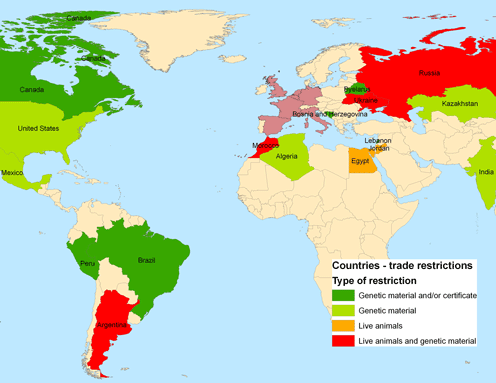SBV: Trade restrictions
Enforced trade restrictions to countries affected by the Schmallenberg virus
18/4/2012
So far, there have been more than 1,800 outbreaks of Schmallenberg disease (SBD) in eight EU countries. However, it is estimated that the number of outbreaks exceed 2,700 at the end of March. Following this increase, seventeen Third Countries have closed their borders to exports of ruminant products from countries affected by the EU (previous communication about restrictions). The list of these countries include the United States, Canada, Mexico, Peru, Argentina, Brazil, Algeria, Morocco, Egypt, Lebanon, Jordan, Ukraine, Bosnia-Herzegovina, Belarus, Kazakhstan, India and Japan (Figure 1). Most of these countries have imposed restrictions on genetic material from ruminants or are demanding the provision of certificates with live animals to ensure they are free of virus. Undoubtedly, the most conservative country is Russia, which has closed its borders to all genetic material and live pigs and ruminants of any EU country since March 20th. The European Commission has opened negotiations with the neighboring country, as it is believed that these measures are excessive and outside scientific evidence. In fact, there is no reported case of SBD in pigs, so it seems obvious that this sector should not be affected by the closure of borders. The Spanish Ministry of Agriculture, Food and Environment (MAGRAMA) works in cooperation with the EU affected countries to minimize the economic impact that these restrictive measures may cause.

Fig. 1. Countries that are imposing trade restrictions on products from the EU countries affected by the Schmallenberg disease
All the information about Schmallenberg Virus is available at Emerging diseases online
Víctor Rodríguez Prieto & José Manuel Sánchez-Vizcaíno
SUAT-UCM


